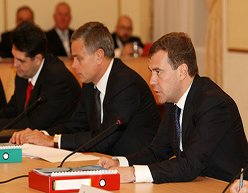President Medvedev mulls membership in OPEC and other global energy organizations

Citing measures to protect the energy sector, most lucrative sector of the Russian economy, Russian President Dmitry Medvedev has said that he does not exclude the possibility of his country’s membership in the Organization of Petroleum Exporting Countries (OPEC), the powerful energy cartel that currently accounts for 40% of oil global production and 75% of world’s known reserves, other existing or new global energy exporters organizations and/or reducing oil production volumes in order to regulate volatile prices on the world energy markets.
The OPEC is very much interested in having Russia — the largest oil producer outside the cartel, and the second biggest in the world after Saudi Arabia, a key cartel state — as a member, and has been courting Moscow to actively coordinate efforts with it and other global energy exporters outside the cartel so as to control oil prices. Two of the new energy organizations being mulled by major hydrocarbon producers include a ‘gas version’ of OPEC and the so-called ‘Gas Troika,’ both of which will include Russia as core member if such organizations become a reality.
Medvedev’s official statement — that Russia would not turn down any possibilities available to it on the global energy markets to protect its oil and gas sectors — means that these issues are being seriously considered at the highest level in the Kremlin. “I would like to stress that the issues at stake are the country’s major export commodities, oil and gas,” Medvedev said in Kurgan, where he officiated a high-profile meeting of federal and regional government officials dedicated to the issues of social and economic development of the Urals Federal District.
The president specifically asked his government to be ready for such moves aimed at protecting the country’s major revenue basis. “And, such protective measures should include reductions in oil output volumes, participation in the existing energy exporters organizations as well as taking part in new ones, if we can reach agreements on such issues,” he said. “I would like to reiterate once more the fact we are talking about the backbone sector of our economy, and therefore, do not have to be guided by some abstract criteria, recommendations of international organizations, etc.,” he added. “Here, we are talking about our core national interests, and therefore, we are going to act in the way we deem best fit on these issues.”












 Web design,
Web design,